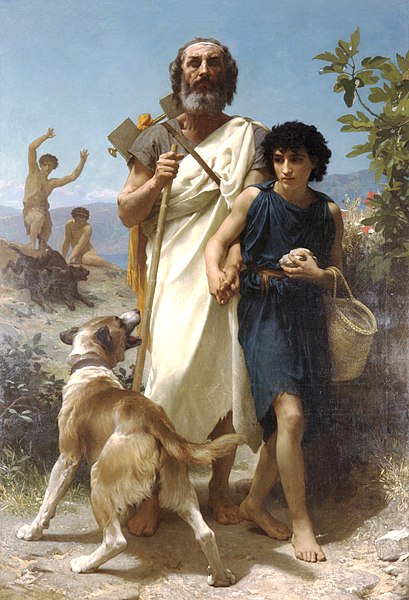 |
| Homer - A Man or Myth? |
As I was thinking what I would address you all on today, (I feel like I have so much freedom in this transition phase !) I thought about some of the most interesting and debated topics of history. I did some Wikipedia surfing and found an interesting post on the
Homeric Question. In sum, this is a complete tearing apart of the man "Homer" to discover the person behind the stories. Was he really one person, are the stories compiled from a "million pieces" format, is Homer a person at all or a descriptor turned to author? All these questions beg answers from only what oral tradition can or could have told them thousands of years ago.

Jumping forward 800 years or so we find the stories of the Apostles of Galilee writing down their testimonies of the gospels. The Christian church was in its infancy when Christ had ascended into Heaven and left Peter, James and John responsible to declare the gospel. At that time, texts were few and far between. Everything from the four gospels was delivered first in the Oral tradition and then transcribed onto papyrus and manuscripts, or the events were memorized and passed on until written. While the exact dates are unclear, most of the writings of the New Testament were first written between 50-90 AD, which means that for twenty years Christ's teachings were told entirely orally or without the aid of official texts. The Bible was not canonized by the early Roman Catholic Church until well after the death of the Apostles and first members of the church. "
Oral
tradition had begun to deteriorate in post-apostolic times, partly
because many or most of the eyewitnesses to the earliest events of
Jesus’ life and death and the beginning of the church had died. Also,
the oral tradition may simply have suffered in transmission." (From
Brittanica). From this transition period of time, many things of that time period are traditional views. For example, the deaths of Peter and Paul in Rome are traditionally accepted. Serving a mission for the church in Italy for two years I learned a lot about traditions and practices. Some of the ones I remember (some I do not share since they are held sacred to many):
 |
| Basilica of Amalfi |
While some of the facts as to these claims are disputable, they nevertheless use oral tradition as the basis of legitimacy. There are also some oral traditions which have been passed down even in the 180 years since the Church of Jesus Christ of Latter Day Saints began. While many of these stories cannot be verified they nevertheless make for great stories to pass on if you feel they are meaningful and valid. Some stories are documented but not generally discussed to to a more sacred nature (a personal dream or vision your relative may have had for example). This all goes to move forward oral traditions of passing on knowledge.
I urge you to think about the stories you may have heard and delve into them, do some research and you may find a nuggets of information you never knew you knew about. I found a lot more about a Lamanite General that I once heard about from early church history. Happy findings!




Okay, so as I was reading about spiritual experiences and the testimonies of the apostles being written down after they were originally spoken orally, I thought of my patriarchal blessing. It was originally given to me orally, my patriarch being a median directly between me and my Heavenly Father. A couple of weeks later, I received a written copy in the mail, but it will never have the same affect as that oral experience did. When I read through it, I can flash back to that experience, but if someone else were ever to read it, they would not have a concept of the feelings I experienced. Our Heavenly Father does does not send us post-it notes when he wants us to know something, he speaks to our minds and our hearts through the Holy Ghost.
ReplyDeleteBlaine and Catherine--wow. I never really realized how oral history originally was, and how oral spiritual experiences are. In regards to spiritual experiences, maybe the fact that they're often so oral contributes to the fact that we have to write them down in order to really remember them...but then, just like you said, Catherine, it never has the same effect.
ReplyDeleteCan we ever FULLY remember oral knowledge?
I think within your own oral knowledge, you may be able to remember everything that was said, but just as Kacee described Islamic oral tradition as being like a game of telephone, things passed between people can not help but lose some of the original knowledge. For example, even in memorizing my part of King Benjamin's speech I mixed up some words. "Glad" does not mean the same thing as "Good." Song, drama and poetry definitely helps to maintain the original words and meaning because they provide structure, meter, tune, rhythm, timing and actions to associate with the words being spoken, but even then things can be heard wrong. I can't be the only one who has sung the wrong lyrics for a song until someone finally pointed out that I wasn't singing it right. I've even done that with hymns in church, which is pretty embarrassing, just so you know.
ReplyDeleteHmmm... interesting post. Oral knowledge sure can lead to a lot of misunderstandings. I decided to read up a little more on relics in the Catholic church after hearing that there were something like three heads of John the Baptist floating around and enough "pieces of the original cross" to make a plethora of crosses.
ReplyDeleteCheck out this link:
http://www.newadvent.org/cathen/12734a.htm